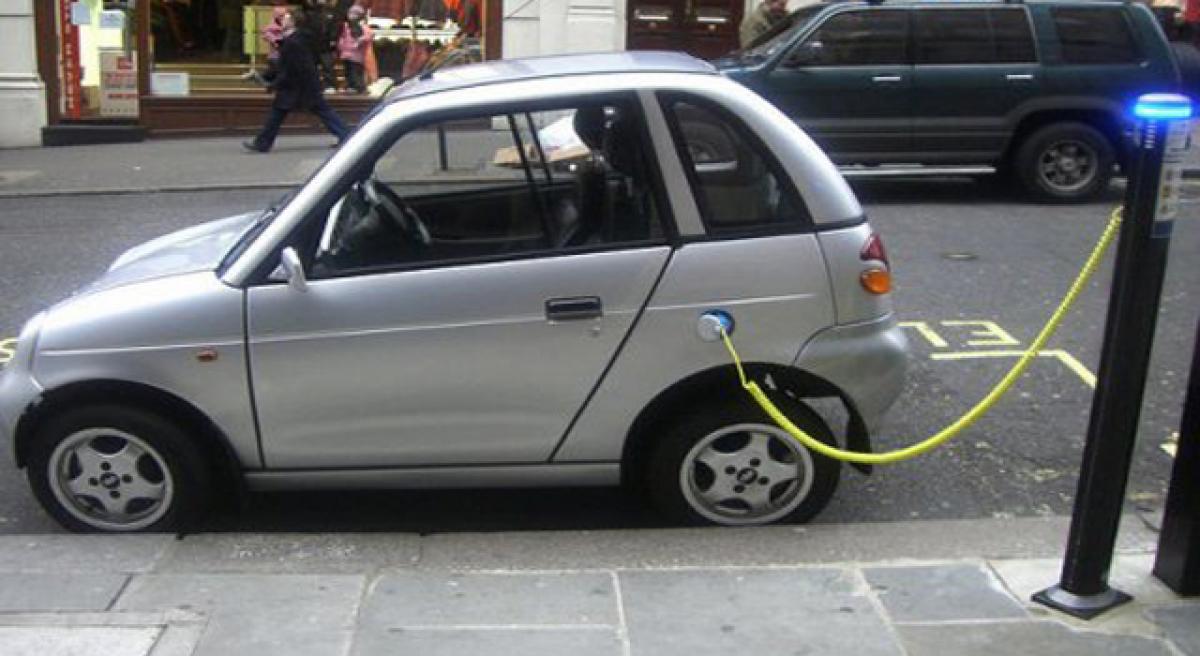Live
- A Soulful Celebration of Global Music
- Brahmin Community delegation felicitates CM Saini
- Allu Arjun Visits Chiranjeevi’s House for Lunch Meet
- Toyota organising TG Grameena Mahotsav
- Special rituals conducted at Maramma Temple
- Siddaramaiah has special love for Muslims: BJP
- We can’t afford spending less than 6% of GDP on healthcare
- Guinness World Record for continuous Hanuman Chalisa chanting
- REMOTE TRIBAL AREA TO GET NEW BRIDGE
- Dr LB College, Woxsen teams win in Climate Tank Accelerator event
Just In

India\'s most influential government think-tank has recommended lowering taxes and interest rates for loans on electric vehicles, while capping sales of conventional cars, signalling a dramatic shift in policy in one of the world\'s fastest growing auto markets.
New Delhi : India's most influential government think-tank has recommended lowering taxes and interest rates for loans on electric vehicles, while capping sales of conventional cars, signalling a dramatic shift in policy in one of the world's fastest growing auto markets. A draft of the 90-page blueprint, seen by Reuters, also suggests the government opens a battery plant by the end of 2018 and uses tax revenues from the sale of petrol and diesel vehicles to set up charging stations for electric vehicles.
The recommendations in a draft report by NITI Aayog, the planning body headed by Prime Minister Narendra Modi, are aimed at electrifying all vehicles in the country by 2032 and will likely shape a new mobility policy, said government and industry sources. The report's focus solely on electric vehicles marks a shift away from the current policy that incentivises both hybrid vehicles which combine fossil fuel and electric power and electric cars, and is worrying some automakers.
"India's potential to create a new mobility paradigm that is shared, electric and connected could have a significant impact domestically and globally," said a draft version of the report, titled ‘Transformative Mobility Solutions for India.’ It would also mark a radical response by India as it looks to cut its oil import bill to half by 2030 and reduce emissions as part of its commitment to the Paris climate treaty.
Officials acknowledge the blueprint faces challenges. "If we accelerate electric vehicle growth it will be a disruption for the auto sector and would require investment, but if we're not able to adapt quickly we risk being net importers of batteries," said a government source involved in the plans.
"There has been resistance from car makers." India's top-selling carmaker Maruti Suzuki has invested in so-called mild-hybrid technology, which makes less use of electric power than full hybrids, while Toyota Motor Corp sells its luxury hybrid Camry sedan in the country. Mahindra & Mahindra is the only manufacturer of electric vehicles in India.
India, in 2015, launched a scheme called Faster Adoption and Manufacturing of Hybrid and Electric Vehicles under which it offered incentives for clean fuel technology cars to boost their sales to up to 7 million vehicles by 2020. Despite incentives as high as 1,40,000 rupees ($2,175) on some cars the scheme has made little progress, with the sales of electric and hybrid cars making up only a fraction of the 3 million passenger vehicles sold in India in 2016.
The scheme, which expired on March 31, has now been extended by six months while future policy is worked out, two government officials said. Lack of clarity on policy risks delaying investment in the auto sector, one official added. The new NITI Aayog report, co-produced with US consultancy Rocky Mountain Institute, outlines a 15-year plan, broken into three phases starting in 2017.
"Limit registration of conventional vehicles through public lotteries and complement that with preferential registration for electric vehicles, similar to that in China," the report said, in one of its most radical proposals. To kick-start the shift, the report suggests bulk procurement of electric vehicles, building standardised, swappable batteries for two- and three-wheelers to bring down their cost and having favourable tariff structures for charging cars.
"Prioritise battery and charging infrastructure development," the report states, while setting a 2018 goal for setting up a 250 megawatt per hour battery plant with an aim to reach one gigawatt of production by 2020.
By Aditi Shah

© 2024 Hyderabad Media House Limited/The Hans India. All rights reserved. Powered by hocalwire.com







